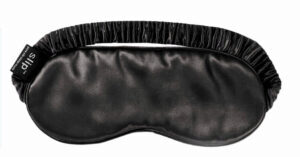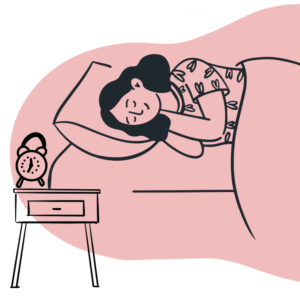We Tried Mouth Tape for Sleep for 2 Weeks: This Was Our Experience
Disclosure: By clicking on the product links in this article, Mattress Nerd may receive a commission fee at no cost to you, the reader. Read full disclosure statement.
After hearing all the buzz on social media about mouth taping for sleep, our editors, Becca and Loren, tried it for themselves. They slept with mouth tape on for two weeks to see whether or not it would improve their sleep quality—or if they noticed any other benefits in general.
What Is Mouth Taping?
Mouth taping for sleep is exactly what it sounds like: taping your mouth shut while you go to sleep. The theory is that this will keep you from mouth-breathing at night. Exclusively breathing through your nose has a lot of benefits. It helps prevent bad breath, may help strengthen your immune system, may help with snoring, and may aid in regulating your breath.
A 2022 preliminary study found that mouth taping improved snoring and reduced the severity of sleep apnea in some mouth breathers. Since it hasn’t been widely studied, more research has to be done for these findings to be conclusive.
Moreover, you shouldn’t just use any adhesive you find around the house as mouth tape—this could cause skin irritation, allergic reactions, or other side effects. If you want to try out mouth taping, make sure you get tape that is meant to go on your mouth as you sleep.
Our Experience with Mouth Tape
Watch Becca and Loren’s full experience as they wore mouth tape every night for two weeks.

Becca’s Experience, In Her Own Words
I’m all for a good health and wellness experiment. Trust me, I’ve tried just about every TikTok trend out there. I’ve heard a few people talking about mouth taping before, but mainly for snoring, which has never been a concern of mine. But the more and more I heard about the other benefits, like increased energy and better oral health, my interest was piqued.
I was pleasantly surprised by the whole experience. I wasn’t sure how I would handle the feeling of having my mouth taped shut, but the product we used was very gentle and comfortable to wear. It didn’t feel constricting at all, but I chose to use the tape in the “I” shape to avoid that feeling. The adhesive was flexible enough that I could still part my lips, and even talk if need be. But, once I was relaxed and sleeping, my mouth stayed shut.
The biggest benefit I experienced was decreased tension in my jaw. I tend to hold a lot of pressure in that area and, at times, I can feel soreness in general. But the tape was sturdy enough that I could completely relax my jaw, while still feeling secure around my mouth. I also noticed a slight reduction in bad breath in the morning, as well as deeper breathing prior to bed— a classic win-win scenario. Lastly, I’d say I found it easier to fall asleep at night. Now, take that for what you will. I have a feeling the tape acts as a signal to your brain, like “hey, it’s time to chill out and rest!” I also use a sleep mask every night, so I think the two sensory disruptors helped a lot with powering me down into sleep mode.
In the morning, I woke up feeling more energized, which I associate with the increased intake of oxygen to my brain while sleeping. The tape was easy to remove and didn’t leave any residue or a mark. The mouth tape we used was single-use, so I just threw it out once I got up. Overall, I found it to be a positive experience and plan on continuing to use the mouth tape going forward.
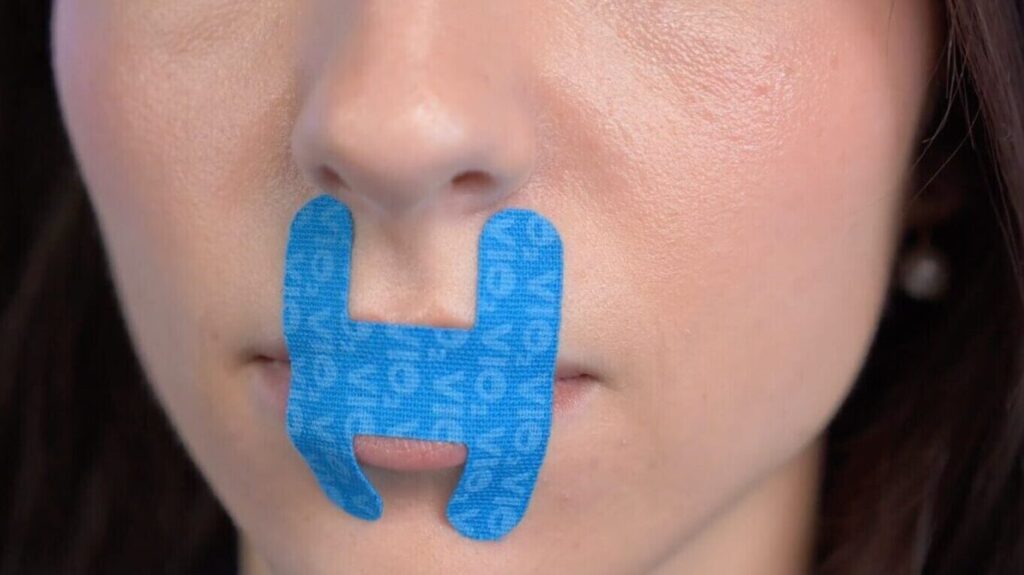
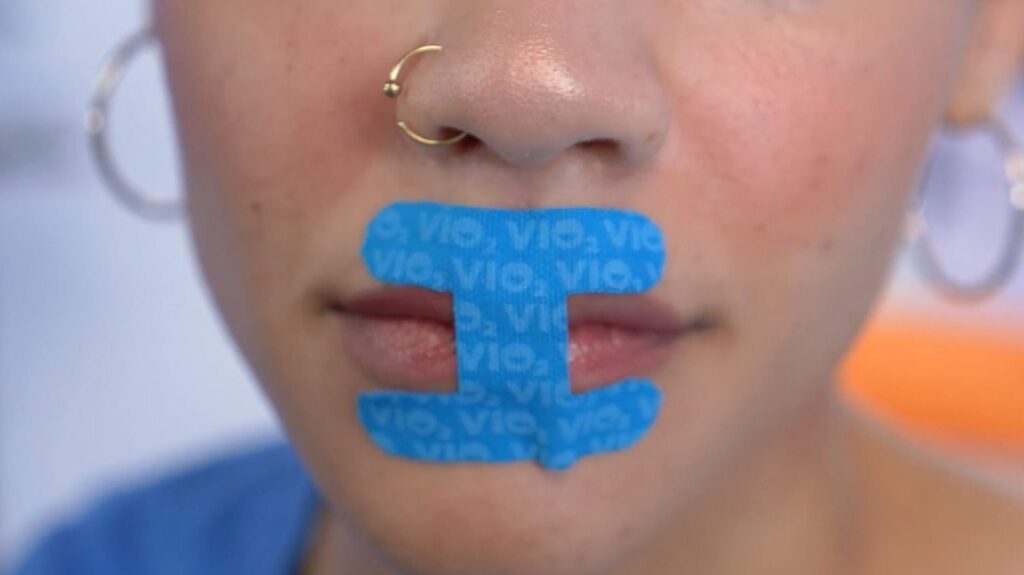
Loren’s Experience, In Her Own Words
I was pretty skeptical that this was going to do anything for me since I don’t snore. Plus, I’m a big sensory gal, so I assumed I’d hate the tape and want to rip it off in the middle of the night, but otherwise, I went into it with an open mind and a plan.
The mouth tape we used was ergonomically shaped, so I had two ways I could wear it: in the shape of an “I” or in the shape of an “H.” The “H” shape seemed really constrictive, so I decided to wear the “I” shape for the first week and the “H” shape for the second.
To my surprise, I really enjoyed sleeping with the “I” shape. I didn’t feel like a kidnapping victim, and I could even still talk if I needed to. I usually wake up with a dry mouth every morning, but since mouth taping, that’s pretty much gone away. Additionally, I woke up with even more moisturized lips, which I was not expecting to be a side effect. My guess is since I wasn’t breathing on my mouth for eight hours straight, I didn’t dry them out. And lastly, I woke up with more energy. Now I don’t know if this is related to mouth taping, but it promised better quality sleep and it delivered.
Becca and I agreed the only con was that the tape was inconsistent. Most nights it stayed on all night, but a few times I woke up with it rolled up in a ball next to me. And I could only tape it in the “I” shape. The “H” shape gave me nightmares about my mouth being zipped shut.
Overall, we would both recommend trying it out for yourself, with permission from your doctor.
Who Should Try Mouth Tape
- Those who want to exclusively breathe through their nose while sleeping
- Those who want to stop snoring
- Those who want to alleviate jaw tension
Who Should Avoid Mouth Tape
- Those who experience sleep apnea—unless approved by your doctor
- Those with severe claustrophobia
- Those who find it difficult to maintain nostril breathing (such as those with a deviated septum)
Mouth Taping FAQs
Does Mouth Taping Help Sleep?
Mouth taping may help with snoring as you sleep. Mouth tape may keep you breathing through your nose, and this breath control could lead to increased REM sleep and decreased snoring. When we tried out mouth taping, we woke up feeling more refreshed and energetic.
What Are Alternatives to Mouth Tape?
If mouth taping is not for you, you can try out some alternatives, like nasal strips. Nasal strips are placed over your nose every night to open the airways in your nostrils. You can also try out breathing exercises to train yourself to breathe through your nose.
Can Taping Your Mouth Help with Sleep Apnea?
A preliminary study has shown that mouth tape can help with the severity of sleep apnea, but there isn’t enough research to conclusively say. We recommend trying out mouth tape during the day if you have sleep apnea before trying it overnight (and of course, consult your doctor first).
Best Mouth Tape for Sleeping
At the time of the experiment, Becca and Loren used the ViO2 tape, however it’s been discontinued. Therefore, a similar option to consider is this generic 90 pack of mouth tape from Amazon.
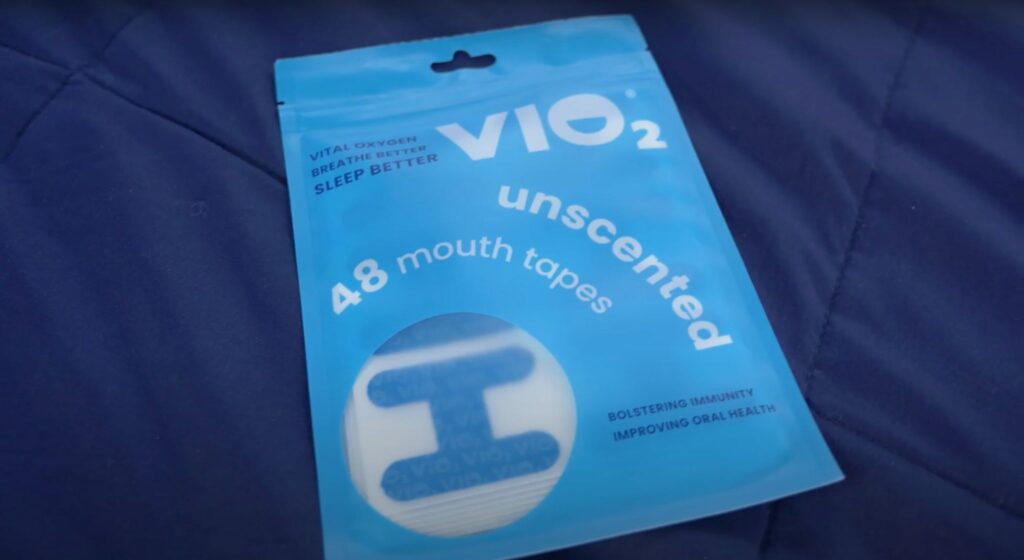
The Bottom Line
Mouth taping has made its way to the internet as a snoring, sleep apnea, and oral care cure-all. After trying it out for two weeks, we noticed some small improvements (like better breath, less jaw tension, and no more dry mouth), but we need to use the tape for longer than two weeks to say anything definitive.
Sources
Lee Y, Lu C, Cheng W, Li H (2022). The Impact of Mouth-Taping in Mouth-Breathers with Mild Obstructive Sleep Apnea: A Preliminary Study. https://pubmed.ncbi.nlm.nih.gov/36141367/

